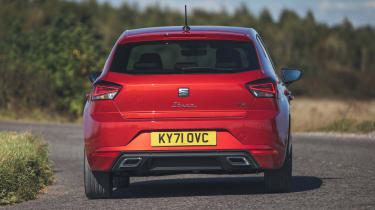SEAT Ibiza review - Engines, drive & performance
A quiet, comfortable and competent driving experience makes the SEAT Ibiza an excellent all-rounder
The SEAT Ibiza pulls off an impressive trick; despite being a relatively small car, it feels so secure and quiet that buyers downsizing from a Volkswagen Golf or Ford Focus are likely to notice little difference when cruising on the motorway.
A lot of this is down to the Ibiza’s proportions. It’s almost exactly the same length as the previous model but, crucially, it’s 9cm wider. This means it feels more secure on the road, and is better configured for long-distance journeys. That extra width doesn’t mean the Ibiza is unwieldy though; its accurate steering makes placing it on the road easy, while its sound driver ergonomics and conventional interior layout mean you get used to driving it quickly.
Although accurate and responsive, the steering isn’t the most communicative. Though you can tell the car has loads of grip in corners by the way it can tackle bends at speed, you don’t feel a lot through the steering wheel. That diminishes its sense of fun and makes the MINI Hatchback a more enjoyable driver’s car.
SEAT has worked wonders on the Ibiza’s suspension, though – it smooths out bumpy British roads in a way that small cars rarely manage. Upgrading to stiffer FR suspension and 18-inch wheels does upset this, however. The Spanish company has also paid considerable attention to the way its latest supermini is put together, which makes it all the more pleasant to travel in.
More reviews
One caveat, though – while it’s still pretty refined, the stiffer suspension and bigger wheels of the FR and FR Sport versions do rob them of some ride comfort and the MINI Hatchback outclasses it for composure, particularly when its optional adaptive suspension is fitted.
SEAT Ibiza petrol engines
The 79bhp entry-level ‘MPI’ petrol engine was a little slow, taking 14.7 seconds to go from 0-62mph, so it’s not entirely missed since its discontinuation. Far better is the three-cylinder TSI turbo-petrol, which does the same in either 10.9 or 10.3 seconds, depending on whether it’s configured in 94 or 108bhp form.
We’re familiar with this engine from both the Volkswagen Golf and Volkswagen up!, and have long been fans of its willing nature and characterful exhaust note. It’s a perfect fit for the Ibiza, revving freely as you accelerate and settling down quietly once cruising. It can be slightly loud when being pushed to the limits of its rev range but, while relatively pronounced, the noise it makes is far from unpleasant.
The 94bhp 1.0-litre comes with a delightfully slick five-speed manual which gels perfectly with the willing, easy-going nature of the engine, although the sixth gear found in the 108bhp version is a nice addition for motorway driving. The 94bhp model needs working a bit harder to get up to speed and it's possible to get caught in the wrong gear at low revs.
There’s also a DSG automatic gearbox option for the 108bhp petrol engine, which will be a boon for mostly urban drivers, but isn’t perfect – go for a quick gap or an overtake and it can hesitate before finding the right gear, sending the revs soaring.
Diesel engine
A 94bhp 1.6-litre diesel engine was part of the range until 2020. It felt a little more urgent than the Fiesta diesel, providing extra confidence when overtaking and joining fast-flowing traffic, although this extra force faded away as engine revs increased. It didn't feel as spritely in town, though, where the 1.0-litre TSI is quicker when pulling away from rest. The diesel couldn't match the petrol engine for quietness, either, even on the motorway.
Which Is Best?
Cheapest
- Name1.0 TSI 95 SE 5dr
- Gearbox typeManual
- RRP£20,175
Most Economical
- Name1.0 TSI 95 SE 5dr
- Gearbox typeManual
- RRP£20,175
Fastest
- Name1.0 TSI 115 FR 5dr
- Gearbox typeManual
- RRP£23,365









